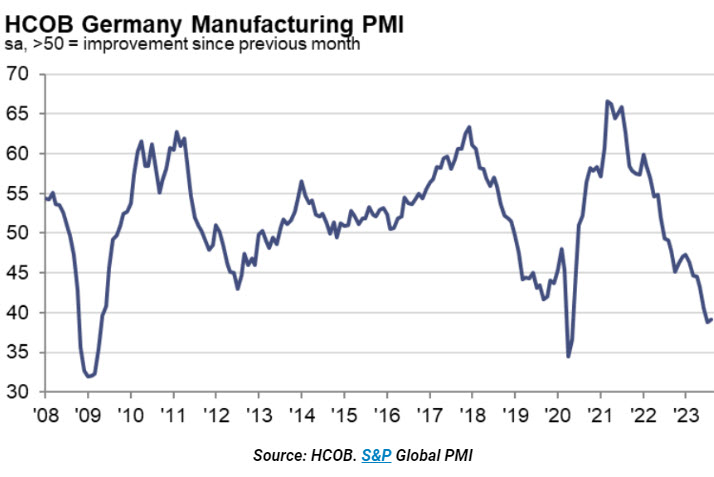Noteworthy
- Dollar Stronger Initially After European PMI’s Disappoint
The U.S. Dollar
German Business Activity suffered its steepest decline in 3 years as lackluster manufacturing PMI was accompanied by a renewed contraction in services activity. The service sector is particularly concerning as it was viewed as a potential saving grace for the German economy, with those hopes now all but erased.
Businesses remain pessimistic on their outlook for the rest of the year with the survey noting an uptick in inflationary pressures largely down to the service sector.
Business Activity in the Euro Area contracted at an accelerated pace for the month of August, with services in particular becoming a concern. Services and Manufacturing reported falling out and new orders with manufacturing recording the sharper rate of decline.
The seasonally adjusted HCOB Flash Eurozone PMI Composite PMI fell to 47.0 in August 2023 from 48.6 in the previous month, well below market expectations of 48.5, a preliminary estimate showed. The latest reading pointed to the steepest pace of contraction in the region's private sector activity since November 2020.
Manufacturing output contracted at the second-strongest pace over the past 11 years, second only to the initial COVID-19 lockdowns, and services output dropped for the first time since last December.
New business inflows fell for a 3rd straight month, excluding the pandemic this is now the steepest since October 2012. New orders for goods continued to fall at one of the sharpest rates since the global financial crises, accompanied by a second month of deteriorating demand for services.
Price pressures increased as well with both input costs and average selling prices rising while expectations around output for the months ahead have reached their lowest point since December 2022. Employment slowed as well registering the smallest rate of job creation since the post-pandemic recovery began. Manufacturing jobs declined for a 3rd straight month while the service sector recorded the smallest net-job gain since February 2021.
The German and Euro Area PMI data has been on a steady decline since its most recent peak in January at 47.3 and 48.8 respectively. This is concerning as a print below 50 means the economy has remained in contraction territory for the entire year thus far with Germany, in particular, an area of concern.
The rest of this week leaves very little in terms of risk events moving forward with the Jackson Hole Symposium taking the limelight. Comments will be delivered by Christine Lagarde which could give a better indication of where the Central Bank stands heading toward the September meeting.
Following today’s data, we have seen the probability of an interest rate hike in September decline from around the 60% mark toward 40%. The data will no doubt give the European Central Bank (ECB) food for thought as talks around a pause are likely to resurface. ECB President Christine Lagarde is scheduled to speak at Jackson Hole on Friday with her comments now looking even more intriguing as market participants look to gauge what the response from the Central Bank will be in September.
This is not a complete analysis of every material fact regarding any company, industry or security. The information and materials herein have been obtained from sources we consider to be reliable, but Comerica Capital Markets does not warrant, or guarantee, its completeness or accuracy. Materials prepared by Comerica Capital Markets personnel are based on public information. Facts and views presented in this material have not been reviewed by, and may not reflect information known to, professionals in other business areas of Comerica Capital Markets, including investment banking personnel.
The views expressed are those of the author at the time of writing and are subject to change without notice. We do not assume any liability for losses that may result from the reliance by any person upon any such information or opinions. This material has been distributed for general educational/informational purposes only and should not be considered as investment advice or a recommendation for any particular security, strategy or investment product, or as personalized investment advice.



